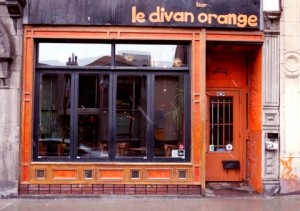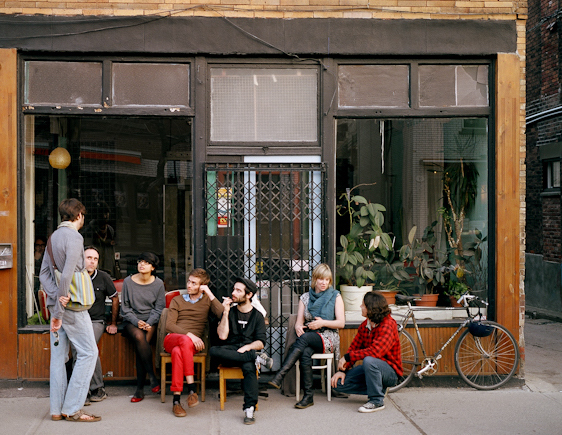Several months later, in February 2018, iconic Mile End coffee shop and live music venue Le Cagibi announced that, due to rent hikes, it would be moving from its location on St-Laurent and St-Viateur to a space five blocks north on St-Zotique Street in Little Italy. Operating for over 10 years, Le Cagibi’s vegetarian menu and small stage in the back room made it an inclusive, intimate space for musicians and music-lovers alike.
Divan Orange and Le Cagibi are both small music venues that showcase under-the-radar acts. As the Mile End gentrifes, intimate music spaces like these are being forced out of the neighbourhood due to financial strain. Not only is this a loss for local artists and regular show attendees, but the closure of these venues is leading to a loss of cultural tradition in Montreal’s vibrant music scene.
In a letter to culture site Urbania, the Divan Orange team cited difficult relationships with neighbours, rent and tax hikes, and a lack of support from public institutions as major factors contributing to the establishment’s closure. More specifically, in 2014, Divan Orange was fined roughly $18,000 due to excessive noise complaints made by a neighbour living above the bar, who reportedly phoned the police 85 times in two months. In response to the fine, members of the Divan Orange cooperative launched two crowdfunding campaigns to get the financial support to pay off the charges, but ultimately, this wasn’t enough to allow the bar to stay afloat.

Julien Senez-Gagnon, a spokesperson for the Divan Orange team, explained to the The McGill Tribune that the bar had been struggling to survive financially for over a year, and that the decision to permanently shut down was due to a lack of resources.
“We mentioned [online] that our financial situation is untenable,” Senez-Gagnon said. “The [noise complaints] hurt us very much.”
Senez-Gagnon noted that Divan Orange’s monetary problems were indicative of a larger issue that other small venues in Quebec are facing. For example, Le Cercle, a restaurant and music venue in Quebec City has also closed its doors due to financial issues.
“[This] is a systemic problem,” Senez-Gagnon said. “It’s not unique to Divan Orange. You see small alternative music venues closing down. We want to [raise awareness] that [other venues like Divan Orange] need support, [whether it be] finance or subsidizing. Montreal holds such a great identity towards its culture.”
Similarly, Le Cagibi is being pushed out of their Mile End location due to financial strain from rent hikes. The Montreal Gazette’s T’cha Dunlevy revealed that the building hosting the café changed owners in 2017, and the new owners increased the rent from $3,417 to $7,500 per month.
“That’s a huge increase,” Pamela Hart, president of Le Cagibi cooperative, said to Dunlevy. “We proposed $5,000 [for the whole space], but [the new owners] said that was absolutely not enough.”
The building is co-owned by Jeremy Kornbluth and Brandon Shiller, who also own the Jean-Talon Market building where a Starbucks was controversially opened in 2015, prompting complaints of gentrification, which led to its closure in 2017. Shiller is the son of Stephen Shiller of prominent real estate firm Shiller Lavy Realties, which has now bought seven commercial properties along the iconic St-Viateur Street in the Mile End. According to Dunlevy, Shiller Lavy Realties has been instrumental in replacing other small businesses along the street, including small locally-owned Pâtisserie & Boulangerie Clarke, which closed in 2015 and was replaced with a chain sushi restaurant.
In the end, Hart explained that the decision to relocate Le Cagibi was not an easy one. The café has been a staple in the Mile End for years, and it has maintained the history of its space (which was previously Café Esperanza, and before that, a pharmacy), by using vintage wood drawers and shelves from its previous occupants. Having lived in the Mile End on and off for over eight years herself, Hart is especially sad to see the cultural environment of the neighbourhood change.
“I’ve seen [the] Mile End change a lot,” Hart said. “What we’re looking at right now is basically a small group of men [coming in] and curating our whole neighbourhood. To me, [that] doesn’t feel right.”
With its new location, Le Cagibi is making big changes. Not only does its management plan to expand its menu options, they are also currently transitioning to a worker’s cooperative structure, in which a team of 10 founding members and five board members work collectively to run the new location rather than having one person in charge of everything. Hart explained that a co-op would allow for employees to have more agency and flexibility in making decisions.
“[The co-op] is much more secure for us in the long run,” Hart explained. “When you have a group of people who are all equally committed, when everyone’s voice is worth the same, it allows you a lot of diversity [and] freedom for individual workers.”
Le Cagibi is also hosting a crowdfunding campaign, seeking $35,000 to cover 40 per cent of moving costs. Unfortunately, the new space has only one room, leaving live music performances out of the question for now.
Emmett McCleary, U3 Arts, has performed at both Le Divan Orange and Le Cagibi. As a musician, he has felt the importance of keeping small music venues alive firsthand.
“Both [Divan Orange and Le Cagibi] are great,” McCleary said. “Le Cagibi in particular. When I was getting started in Montreal, it was good because it was incredibly cheap to book […] at $75 per night. [As a musician just starting out], you can [easily] book shows and play live. It makes the whole bureaucracy [of booking shows] more accessible, and you don’t have to […] know someone who knows someone.”
McCleary acknowledged that while McGill students may feel helpless as they watch their favourite cafés and music venues close, it is important to continue to go see live shows to support both the acts and the venues.
“Continue to seek out live music in non-traditional places, and support local music wherever it exists,” McCleary suggested.
Both Senez-Gagnon and Hart confirmed that public support for the venues has been overwhelming, with people expressing emotional and financial support through social media and crowdfunding.
“People had [Divan Orange] really close to heart,” Senez-Gagnon said. “People really loved it, musicians as well as the general public. Even when [we] were going through hard times, the public has always been there for us. It’s actually what kept us going for so long, to see that support.”
Hart also believes that raising awareness on social media is an important way to support venues such as Le Cagibi if donating isn’t an option.
“The community has [really been] there for us,” Hart said. “[Students can support us by] sharing our events and coming to our shows. We want to see all our favourite students [at our new location, whether] it be studying with their laptops or [enjoying] a cup of coffee. We want everyone to feel welcome and invited.”
Divan Orange’s last show is set for March 18, and Le Cagibi plans on relocating in April.







